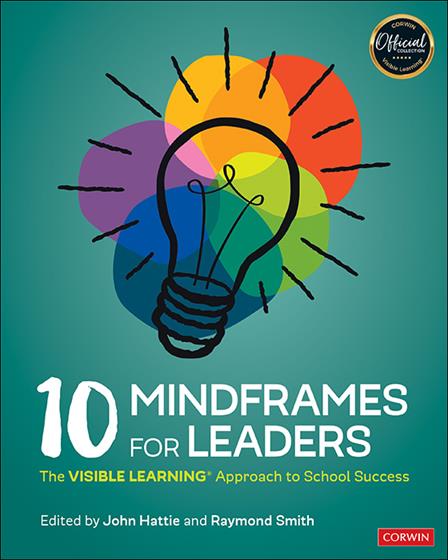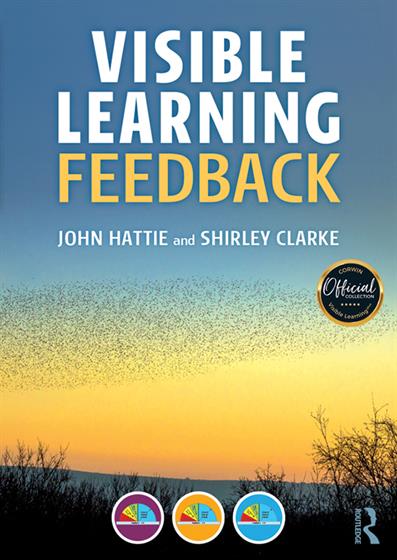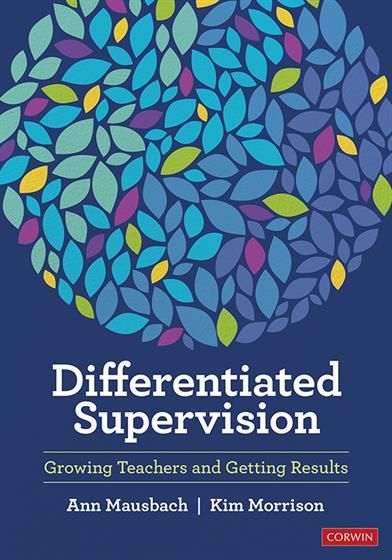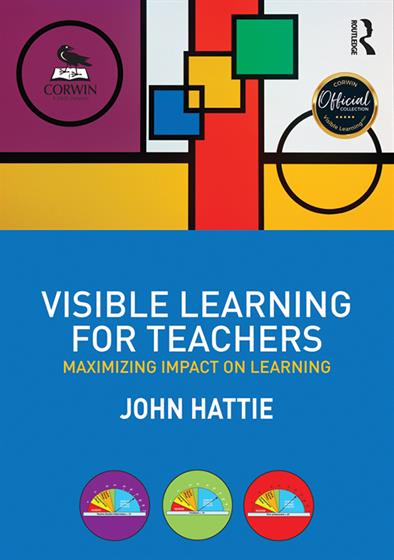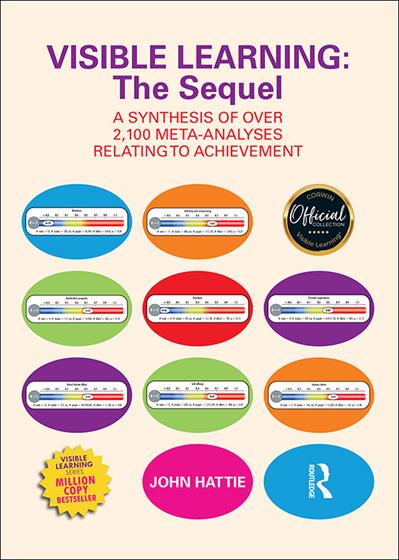Series 5 Leaders Coaching Leaders Podcast
[00:00:00.68] SPEAKER: Welcome to Corwin's Leaders Coaching Leaders podcast
with host, Peter Dewitt. This podcast is from education leaders for education
leaders. Every week, Peter and our guests get together to share ideas, put
research into practice, and ensure every student is learning not by chance, but
by design.
[00:00:19.69] TANYA: Hey, Peter.
[00:00:21.34] PETER DEWITT: Hey, Tanya, how are you?
[00:00:22.99] TANYA: I'm really good.
[00:00:25.22] PETER DEWITT: Well, today's-- I'm pretty excited about today's
recording just because-- well, a few reasons. One, it gave me the opportunity
to actually spend a lot of time off air talking with them. But it's also just
such an honor when I get the opportunity to have a conversation with John
Hattie, who is our guest today. Many people are going to know that John is
professor Emeritus from the University in Melbourne, in Australia.
[00:00:50.81] He's won numerous awards, both state, country, worldwide. He's
the most cited educational researcher in the world. And he just released
Visible Learning, the sequel, which is really exciting. Which is something,
actually, we talked about in the podcast as well. But John more than that, I
feel very fortunate because he's also a friend. And he's been a mentor of mine over
the years. I've always felt honored that I know him. And the person, not just
the researcher, but the person John Hattie is a pretty spectacular guy.
[00:01:32.01] So this conversation was really good. I should give people a
heads up, though, that I was recording from my hotel room in California because
I was there for work. And John was recording from Melbourne at home, where he
was also a little bit sick. Not COVID, but he was feeling a little bit sick. So
he was huffing a little bit, which he worried about. But I don't think people
will care because the substance of the conversation is more important than any
of that.
[00:02:02.07] TANYA: Oh yeah, his coughing, if we don't edit it out, it is
not disruptive to the conversation at all. And what a joy it must be to have
access to a mind like Hattie. Because it comes with so much knowledge. I mean,
one of the things about listening to him is that any question you posed to him
across the educational landscape because he's got so much data at his fingertips
and he's just so immersed in this world, he can bring a perspective to it so
quickly, that's just so helpful for you to or me as a listener just to get some
context. And really, maybe think about what seemed like a simple discrete thing
in this different way.
[00:02:50.17] So I know listeners, most of them know who Hattie is. He's
almost a household name, especially for educators. And it won't disappoint. I
like that this book is not a second edition. He really goes into why it's a
sequel or an extension of the work that he's done with the first book. And I
think he has some really great insights to share about what's coming up in this
new text.
[00:03:21.30] PETER DEWITT: It's always on my mind when I think about his
research. Not just from the effect size piece because I think that's what
people gravitate to, but also just from the-- well, this is how it's looked so
far. And this is how impactful it's been. But if we can do things a little bit
differently where this is concerned, then maybe the impact will be greater. Or
just the idea of being more intentional about understanding that we need to be
able to focus on learning.
[00:03:48.60] And then you go into so many situations, where people are
focusing on the adults or on tasks that they need to be able to do. And when
you bring it back to student learning, which is what John does, that's really
important. And I agree with you when it comes to the sequel. I remember it was
years ago, I was running a workshop in Wisconsin. And one of the first things I
asked is, what do you know about John Hattie's research?
[00:04:10.48] And there were a few people that actually said, well, his
research is very dated. It's from the 70s and 1980s. And the book came out in
2009. It's seven years later or something like that. And I said, OK, thanks,
that's really interesting. Because John actually updates his research more than
anybody that I know. And he talks about that within this recording, which is
important.
[00:04:37.29] Because I think people will look at the sequel and say, Oh
good, he's updated some research since 2019. But they need to know he's always
done that. And in fact, I would say, since that time, not only has he updated
his research based on other meta-analysis that came in, but he's also updated
his research based on feedback that he's received from people. That the sequel
is more than just a continuation of a research, it's also those situations that
he was in, where people were giving him feedback that he was deeply listening
to. And that he would consider that as he moved forward.
[00:05:17.13] TANYA: Yeah, I mean this is what we should expect from
scholars. Things don't stay the same. Things are supposed to evolve and change.
And so if there's any idea that scholars, once they figure something out, they
know it. And they're done. That's actually the problematic way of thinking and
doing the work.
[00:05:33.50] PETER DEWITT: Yeah. So--
[00:05:35.20] TANYA: Without further ado.
[00:05:37.03] PETER DEWITT: Happy listening because I could talk about John
for hours at a time. So happy listening. I hope they find the recording, the
conversation to be as amazing as I always do.
[00:05:50.14] TANYA: Oh, they will. So without further ado, listeners, we
bring you John Hattie and Peter. And we will see you on the other side.
[00:05:58.34] [MUSIC PLAYING]
[00:06:01.57] PETER DEWITT: John Hattie, welcome to the Leaders Coaching
Leaders podcast.
[00:06:05.44] JOHN HATTIE: It's good to be back, Peter.
[00:06:07.36] PETER DEWITT: It's good to see you and good to talk to you.
Thank you for coming on. I want to say, congratulations because the Visible
Learning sequel has come out. So talk to us a little bit about, first, why did
you decide to write a sequel after all these years?
[00:06:25.77] JOHN HATTIE: Peter, it's got nothing to do with Star Wars.
It's to do with-- the pressure I had on me was to write a second edition. And
in the second edition, it's updating the 2008 book. And things have changed
dramatically since 2008 for me. For example, there were 800 meta-analysis in
2008. There's now 2,100 as of 2022. I wanted to spend a lot more time on the
story, rather than on the data.
[00:06:56.55] As you know, Peter, because you've been intrinsically involved
in this, we've done a lot of work since 2008 in schools. 10,000 to 15,000
schools, 200,000 to 300,000 teachers. We've learned a lot from that. And so you
can see that there's a whole lot of things I've learned since [INAUDIBLE]. And
I don't want to call it a second edition because the expectation is it'll be
the old book updated. But I do want to base it on the old book. Hence, the
notion of a sequel.
[00:07:18.90] But Peter, you can be assured there will be no prequel. It's
OK. And so that was the main reason is to spend a lot more time on the story.
There's no references to the meta-analysis in the new book. There's not as much
data in the new book. The barometer has changed, primarily, because with 350
influencers, that's another 108 pages. There's another 200 pages of references.
[00:07:47.79] If I put all the data in, it would be another 400 pages. It's
thick enough as it is. So all those details, critical as they are, we've put on
the web as a free website called MetaX. So you can follow up all that detail.
So the book is much more about the story. And it's about where I am in my
thinking about that story, that underlies those influences, the most
successful.
[00:08:08.84] The other thing, Peter, is about five years ago, we ditched
the league table, the list of influences. It was too often misinterpreted. It
work for a while, got attention. But then it was misinterpreted. So we've
ditched that. And trying to spend a lot more time on that explanatory story.
[00:08:27.90] PETER DEWITT: Yeah. To me, it's always been interesting
because I mean, I've worked with you over the years. And I remember I was
presenting somewhere. And they said, well, he uses a lot of older data and
stuff. And I'm like, but John's research is probably the most current research
you could ever have because it's always being updated. And they didn't know
that.
[00:08:47.35] So even though I see the sequel and we talk about the increase
in the number of meta-analysis and stuff, I've always known you to just be
updating your research all the time. I feel like you just finally had time to
breathe and actually do a sequel because you've been doing this work all along.
It's not like 12 years later, 15 years later, you decided, hey, I'm now going
to write a sequel.
[00:09:12.42] I think it's that research has always been there because
you've always been keeping it so current. You just finally had the time to put
it down on paper. Would that make-- does that make sense?
[00:09:23.13] JOHN HATTIE: It did. And actually, COVID helped. I retired
from my university job before COVID came along. And for the first time for eons
of my life, I had concentrated time that I could sit down and write. So that
helped dramatically get through it. And yes, I have kept up to date on the
meta-analysis. I still do every time they come out. I've got systems built in
my computer systems to alert me to new meta-analysis. I add them to the
database. MetaX, we update it once or twice a year.
[00:09:51.82] We're still doing that even though the sequel came out. I
stopped July 2022. I said, that's it. I'm going to write the book up till that
date. Obviously, in the last year, there's been another 100 odd meta-analysis
came out. So research didn't stop in 2008. I noticed one of the Twitter
comments about the new book recently is, oh, has he changed his mind? And I
want to go back to that person and say, do you still teach as you did 15 years
ago? Yeah.
[00:10:22.97] And when I hear you say you have systems in place in this
computer, all of a sudden, I just had this image of in your basement, you and
Janet have this huge master computer that we should be looking at. One of the
things that you said early on when we first started this conversation is the
idea of you've learned a lot. And I think that because you talk about learning.
so much and facilitate those conversations among others, I think it would be
interesting for people to hear, what have you learned actually over the past 15
years?
[00:10:58.71] Well, I think there are many major messages. There's a new
chapter in the book on learning. It seems surprising now looking back in 2008
that, that didn't figure as much despite the title. The criticism is that you
can't see learning. It's not visible. And my argument is that's correct. That's
why the book's called that because we want to try and make that learning more
visible.
[00:11:22.49] That learning is always about something. And that is really
critical to the whole equation. And teachers actually don't cause learning.
It's the kids that create the learning. And so trying to make that more clear,
the concept of clarity, I underestimated that. And our colleagues Doug Fisher,
Nancy Frey really highlighted that for me. I have moved to my feedback work.
Not just looking at the feedback that's given, but also how it's received.
[00:11:51.14] I've learned a lot about that. I've probably spent-- 2008, I
did struggle with the effect size of teaching methods. And I probably spent
more time worrying about that since. And it wasn't until I will spend a lot of
time trying to understand some of the low effects, like the low effect of
problem-based inquiry discovery. It's very low effects. And I spent a lot of
time going back through all those meta-analysis.
[00:12:15.15] And in fact, it was Philip Dewey from Switzerland who brought
to my attention one of their studies of problem-based learning in medical school.
Effect size in first year is zero to negative. Effect size in fourth year, 0.4.
And then it became pretty obvious what was going on, that if students don't
have the content before they go into problem based, it doesn't work. It exclude
it.
[00:12:37.62] And so I've developed in the new book, this notion of
intentional alignment. That we have various levels of complexity of what we
want to teach. The content, the relationships between the content, and the
transfer. And different teaching methods affect those outcomes. Now, here's the
bad news, Peter. By age eight, most kids learn despite what teachers say, what
learning is about is knowing what. And no matter what teachers say, it comes
back to that.
[00:13:06.30] And the argument I'm putting in the book is OK to be greedy.
We can go for all levels for knowing lots, the knowing how, the relationship
between ideas, and the knowing with the transfer. The learning strategies
differ, depending on the level of complexity. The teaching methods differ. And once
that model was developed, suddenly, a lot of the teaching strategies made a lot
of sense.
[00:13:31.06] Here's the weird thing. There are hardly any teaching methods
that exist that cover all three levels of cognitive complexity. Jigsaw is the
only one. Maybe, the padiham notion that comes out of North Carolina is pretty
close. The other thing that I find fascinating, Peter, is that there's
virtually no research on the quality, the impact of lesson planning, of lesson
plans. And there's a massive gap, particularly given the workload that teachers
put into that.
[00:13:57.58] So it's not what I've just learned, it's what I've learned
that we don't know much about. And then coming to the heart of what you do in
your day life, how do you get this message across in schools about what the
story is? Every teacher who ever has been in the profession has a very strong
theory of teaching. I have a theory of teaching. Mine's not necessarily right
or wrong.
[00:14:21.18] And how do you actually have that conversation? So it's not
just someone listening to tips or tricks, but you're actually getting to that
deeper understanding of what happens. And in the new book, I look at not only
the mind frames of teachers, and leaders, and students, and parents, and
climate, and culture, but also underlying that is this notion of how we make
evaluative decisions to do this rather than that.
[00:14:48.28] How we-- and I like the word, evaluative, because it puts the
emphasis on value. How do we make those value decisions in here, in the moment
of the classroom to focus here rather than there? That's the essence of the
expertise. So that's what a lot of the new book goes into.
[00:15:03.00] PETER DEWITT: I think one of the things that I always got from
you over the years is that the research is important. Obviously, we know that.
Effect size is all of that. But I think part of what I've learned from you is
that the larger message is really to just let's talk about what teaching and
learning looks like, to just have the conversation.
[00:15:28.27] Because too often, I feel like people, especially, maybe,
during COVID and after COVID, they go in to teach. But they don't really take
time to talk about what they're learning in the process. And I feel like even
when I'm working with districts-- districts are big on saying, their principals
need to be instructional leaders. But when you go to a district meeting,
leaders are being talked at.
[00:15:54.53] And I feel like your work has always been about let's have the
conversation about what these things could look like. Would that be fair to
say? Because I think if you want to go into the weeds, the research can be very
complicated. But I think the other side, the very practical side is to say, can
we at least take time to sit back and actually talk about teaching, and
learning, and what's working and what's not within our schools. Would that be
fair to say?
[00:16:24.93] JOHN HATTIE: Peter, we ask students to come to school.
Actually, we don't ask them, we make it compulsory to come to school because we
believe that our model of schooling, excuse me, makes a difference to the
student's learning, love of learning, joy of learning, and learning about. I
don't see why it's any different when we talk about teachers. The same model,
we should apply.
[00:16:46.55] And we know that in classrooms, that balance between monologue
and dialogue is pretty critical. We know that understanding how students are
thinking, how they're processing, how they're appreciating classes. And all
that is absolutely critical. It's no different with adults.
[00:17:04.49] And you're right, so much professional learning. And we
sometimes don't know-- oops, sometimes we don't know why the teachers are in
the room. They don't know why they're in the room-- oops, they have to be
there. I'm just watching. I thought my mute was on. Sorry. I've got a cold,
Peter. So I'm--
[00:17:25.58] PETER DEWITT: Oh, no, I'm sorry. I feel like I caught you at a
bad time. But I'm thankful--
[00:17:29.41] JOHN HATTIE: It's not a flu. It's only a cold. And so why the
teachers are in the room. And sometimes, we're not very good at diagnosis of
understanding. Sometimes, we don't appreciate that teachers have very strong
theories of teaching. And we just-- oh, excuse me. And we don't acknowledge
that. Peter, your work and Jenny's Donoghue's work on collective efficacy is
very much based on listening to the perceptions, the views of the people in the
room, as opposed to talking to them.
[00:18:02.53] It involves social sensitivity. That ability to demonstrate
that you do understand what other people are saying. I'm not saying that does
not exist in professional learning. That would be wrong. But so often,
professional learning is seen as come in here, someone give a talk. And we know
the effect size of that. It's extremely low. It's getting into that brain. It's
getting into that understanding. It's hearing what your theory of teaching is,
Peter.
[00:18:27.29] One of the things I think that teachers struggle with is
evidencing their impact. Because to them, it's obvious. But unfortunately, it's
not as obvious as they think it is. And one of the beauties of teachers is
teachers are brilliant critics. And we can use that too. It's positive to say,
how do we get other critics? Or whether that evidence is sufficient or whether
it's powerful enough.
[00:18:46.75] And this is really getting to the heart of what you do in your
collective efficacy. But you can-- but my point being is it does require a
dialogue. And so yes, in the same way it does in the classroom. And as many of
my critics say, of course, it's different when you're talking with
five-year-olds, and 15-year-olds, and 45-year-olds. I don't think it is that
much.
[00:19:06.91] PETER DEWITT: Yeah. I feel like when-- part of what's
interesting to me is that, do you think that teachers understand their theory
of teaching?
[00:19:25.03] JOHN HATTIE: Oh, I think--
[00:19:25.66] PETER DEWITT: Teachers have a theory of teaching. Do you think
they understand-- do you think they know what their theory of teaching is like?
I was talking to somebody today about self-awareness and leadership, which is a
topic that I'm deeply interested in right now. And how self-aware are you of
your leadership styles? And I had a couple of principals today just say things
like, I'm a transformational leader. I'm like, could you tell me more?
[00:19:48.98] And I felt like it was something they just grabbed at and used
the words. But they didn't have a deep sense of that. Do you think people have
a theory of their own teaching?
[00:20:00.04] JOHN HATTIE: You're right. They use certain words. And that
can be misleading. But I think if you actually spent time with that leader
about, how do you make the decisions? Why do you focus on this rather than
that? How do you-- what's your concept of impact of the school? What's your
narrative you want to have? They can wax lyrical about all that.
[00:20:17.38] Now, to say it brings together in a developed theory may be a
bit strong. But they do have very strong views about why they do this rather
than that. And it's like-- take, for example, the concept of evidence. Some
think that evidence is what they see in the classroom. But as Graham Nuttall
shows, they don't see 80% of what happens in the classroom. Some of them think
evidence is that kind of stuff.





